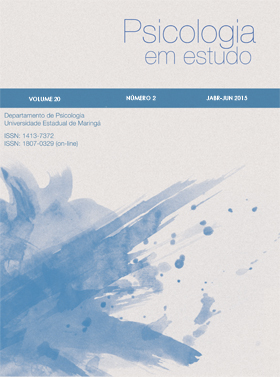PSYCHOPATHOLOGY AND ABSOLUTISMS: UNIVERSALISM, OBJECTIVISM AND FOUNDATIONALISM IN MENTAL HEALTH
Abstract
The area of psychopathology –, that which contains the set of knowledge related to mental illness – is permeated by several controversies of theoretical, practical, ethical and methodological scope. The great diversity of explanatory models is one of the characteristics of psychopathology that contributes to the creation and maintenance of these existent controversies, while at the same time establishing challenges for the professional that is dedicated to this área of knowledge. In this article we defend the conception of the existence of absolutisms such as universalism, objectivism and foundationalism contribute to the difficulties of dialogue between professionals who are adept of the different explanatory models existing in psychopathology. Such difficulties undermine both scientific research and the treatment of patients themselves and, therefore, a better understanding of absolutisms is urgently needed in order to overcome them, which is the main objective of this article. As an alternative to absolutisms we defend both pluralism in all the areas referred above and dialogue in the sense proposed by Hans-Georg Gadamer. This favors the democratic existence of the diversity of explanatory models without incurring in dogmatisms that hinder or even impede interprofessional dialogue.
Downloads
References
Audi, R. (1999). The Cambridge dictionary of philosophy. New York: Cambridge University Press.
Bernecker, S. (2006). Reading epistemology: selected texts with interactive commentary. Malden: Blackwell Publishing.
Bernstein, R. J. (1996). Beyond objectivism and relativism: science, hermeneutics and praxis. Philadelphia: University of Pennsylvania Press.
Berrios, G. E. e Marková, I. S. The self and psychiatry: a conceptual history. In: Kircher, T e David, A. (2003). The self in neuroscience and psychiatry. Cambridge: Cambridge University Press.
Berrios, G. E. e Marková, I. S. (2002). Conceptual issues. In: D´haenen, H. A. H. den Boer, J. A. e Willner, P. (Eds). Biological psychiatry. England: John Wiley & Sons.
Bertrand Russel (1956) Mysticism and logic and other essays. London: George Allen & Unwin LTD.
Chalmers, A. F. (1993). O que é ciência afinal? São Paulo: Editora Brasiliense.
Cushman, P. (1995). Constructing the self, constructing America: a cultural history of psychotherapy. USA: Da Capo Press.
Dalgalarrondo, P. (2008). Psicopatologia e semiologia dos transtornos mentais. São Paulo: Editora Artmed.
Descartes, R. (1969). Meditations, vol. 1 of Philosophical Works of Descartes. Cambridge: Cambridge University Press.
Downing, J. N. (2000). Between conviction and uncertainty: philosophical guidelines for the practicing psychotherapist. New York: State University of New York Press.
Freud, S. (1996). Dois verbetes de enciclopédia. In Edição Standard Brasileira das Obras Psicológicas Completas de Sigmund Freud (Vol. XVIII). Rio de Janeiro: Imago. (Trabalho original publicado em 1923 [1922]).
Freud, S. (1996). A história do movimento psicanalítico. In Edição Standard Brasileira das Obras Psicológicas Completas de Sigmund Freud (Vol. XIV). Rio de Janeiro: Imago. (Trabalho original publicado em 1914).
Fulford, K. W. W. The next hundred years: watching our Ps and Q. In: Fulford K.W. M., Davies, M., Gipps, R. T., Graham, G., Sadler, J. Z., Stanghellini, G. e Thornton, T. (2015). The Oxford handbook of philosophy and psychiatry. United Kingdom: Oxford University Press.
Gadamer, H.-G. (1999). Verdade e Método - traços fundamentais de uma hermenêutica filosófica. Petrópolis: Editora Vozes.
Gaukroger, S. (2012). Objectivity: a very short introduction. Oxford: Oxford University Press.
Hábl, J. (2011). Problem of epistemological foundationalism. Paideia: philosophical e-journal of Charles University, 4(8).
Houaiss, A., Villar, M. S. e Franco, F. M. M. (2001). Dicionário Houaiss da língua portuguesa. Rio de Janeiro: Editora Objetiva.
Kecmanović, D. (2011). Conceptual discord in psychiatry: origin, implications and failed attempts to resolve it. Psychiatria Danubina, 23(3), 210-222.
Kirschner, S. R. e Martin, J. (2010). The sociocultural turn in psychology: the contextual emergence of mind and self. New York: Columbia University Press.
Knowles, E. (2004). The Oxford dictionary of quotations. Oxford: Oxford University Press.
Krausz, M. (2010). Relativism: a contemporary antology. New York: Columbia University Press.
Polkinghorne, D. E. (2000). Psychological inquiry and the pragmatic and hermeneutic traditions. Theory and Psychology, 10(4), 453-479.
Sellars, W. (1963). Science, perception and reality. London: Routledge and Kegan Paul.
Skirry, J. (2010). Compreender Descartes. Petrópolis: Editora Vozes.
Zachar, P. (2014). A metaphysics of psychopathology. USA: MIT Press
Copyright (c) 2020 Psicologia em Estudo

This work is licensed under a Creative Commons Attribution-NonCommercial 4.0 International License.
As opiniões emitidas, são de exclusiva responsabilidade do(s) autor(es). Ao submeterem o manuscrito ao Conselho Editorial de Psicologia em Estudo, o(s) autor(es) assume(m) a responsabilidade de não ter previamente publicado ou submetido o mesmo manuscrito por outro periódico. Em caso de autoria múltipla, o manuscrito deve vir acompanhado de autorização assinada por todos os autores. Artigos aceitos para publicação passam a ser propriedade da revista, podendo ser remixados e reaproveitados conforme prevê a licença Creative Commons CC-BY.
The opinions expressed are the sole responsibility of the author (s). When submitting the manuscript to the Editorial Board of Study Psychology, the author (s) assumes responsibility for not having previously published or submitted the same manuscript by another journal. In case of multiple authorship, the manuscript must be accompanied by an authorization signed by all authors. Articles accepted for publication become the property of the journal, and can be remixed and reused as provided for in theby a license Creative Commons CC-BY.
















